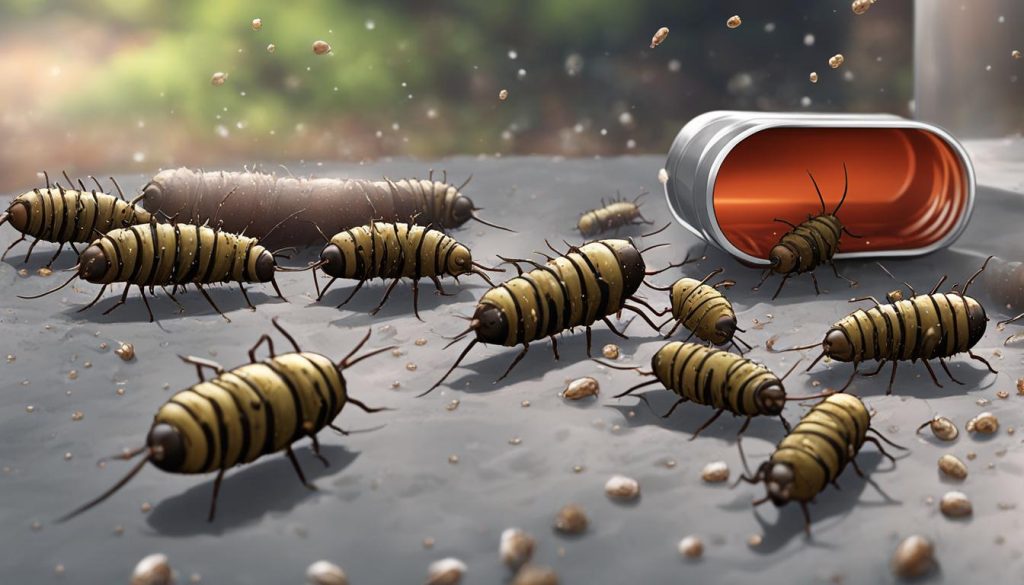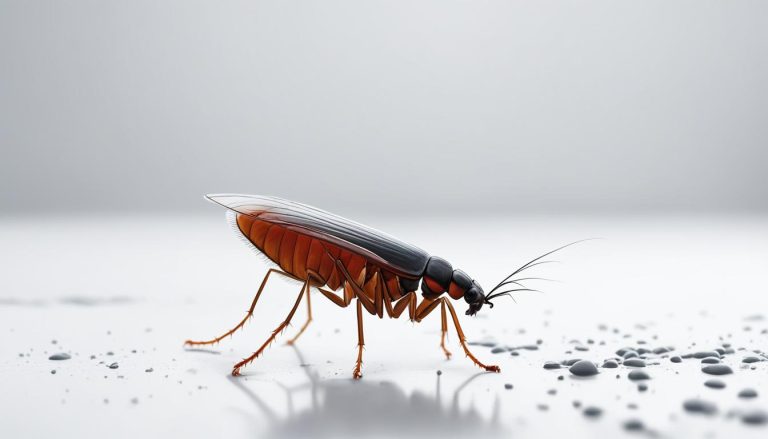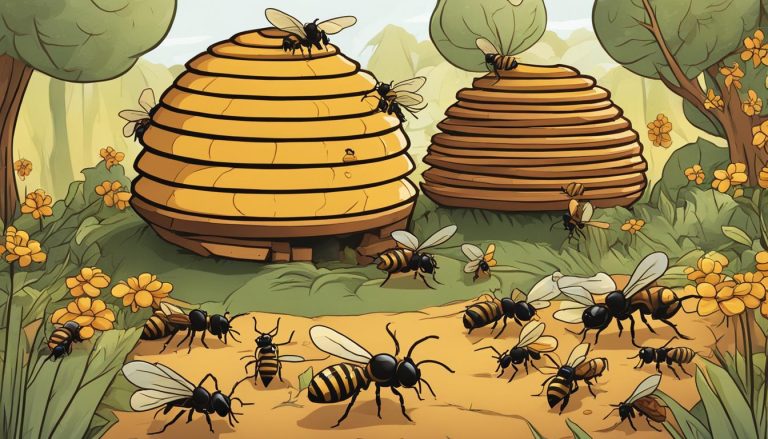It’s a question many of us have pondered: will ant killer kill maggots? When you spot those little wrigglers at home, it’s natural to want them gone quick smart. But using just any ant killer for maggot infestations might not do the trick. So, we’re here to give you the lowdown on what works.
Maggots aren’t like your usual crawlers; they’re actually baby flies and look like tiny white worms. Finding a squirming bunch of these can make your skin crawl. No worries though, because we’re going to sort through the nitty-gritty of getting rid of them, and whether ant killer can come to the rescue.
Key Takeaways
- Ant killers and maggot killers aren’t always the same, but some treatments overlap.
- Maggots are fly babies and look like white, squiggly worms.
- These little critters pop up around garbage, dead stuff, and leftovers.
- They’re part of nature’s cleanup squad, recycling waste and stuff.
- Getting rid of maggots might need special treatments like boiling water or vinegar.
- Some ant killers with specific ingredients can also knock out maggots.
- Always check if a product’s safe and won’t hurt the environment or other critters.
Understanding Maggot Infestations and Their Diet
When we peek into the somewhat distasteful yet fascinating world of maggots, we uncover a remarkable system that nature has perfected over millennia. These tiny, wriggling creatures, often unwelcome in our homes, have a pivotal dietary role that we cannot overlook. By focusing on their behaviors, common haunts, and ecological significance, we can better appreciate their place in the natural order – and why they might fall victim to ant killer products.

The Life and Times of a Maggot: Development and Behaviour
The sight of maggot infestations may unnerve many, but understanding their life cycle is the key to getting rid of maggots using ant killer. Beginning as eggs, maggots hatch and immediately commence their mission: to consume and grow. They are constantly on the move, searching for the ideal place to transform into pupae and eventually emerge as the next generation of flies.
Common Diets: What Attracts Maggots to Your Home?
Maggots are not fussy and will feast on a smorgasbord of decomposing organic materials. Therefore, it is not uncommon to find them making themselves comfortable in areas replete with potential food sources:
- Leftovers and food scraps in kitchen bins
- Decomposing fruits and vegetables
- Unnoticed remains of perished animals
- Manure or pet faeces
These spots offer a banquet for maggots, often leading to the need for killing maggots with ant spray or other methods to manage these uninvited guests.
The Role of Maggots in Nature: Decomposers in the Ecosystem
Despite the ick factor, maggots have an admirable job – they are nature’s cleanup crew. They dine on dead and decay, contributing to the cycle of life by breaking down waste that would otherwise be a hotspot for bacteria. Some types of maggots have even specialized in what they eat, with certain adults seeking out particular decay to lay their eggs. This specialization aids in their survival but also ensures efficiency in the decomposition process.
In homes, the challenge arises when these natural processes intersect with human living spaces. Discovering that maggots killed by ant killer reflect a cross-over of pest control methods which may hint at their versatility in dealing with a range of household pests. Although ant killer effectiveness on maggots may seem coincidental, it reinforces the concept that the elimination of unwanted insects often requires a multi-faceted approach.
Will Ant Killer Kill Maggots
If you’re dealing with a maggot problem, you might wonder if ant killer is the answer. The short answer is: it depends on the product. Like dealing with ants, maggot extermination often requires products that can target and destroy these unwanted guests. Ant killer isn’t designed for maggots, but some key ingredients may overlap.
For example, baits that contain hydramethylnon and S-methoprene can affect maggots similarly to ants. Hydramethylnon has a profound effect on insect metabolism, leading to the demise of larvae, often within three days. On the other side, S-methoprene hampers the maggots’ life cycle, preventing them from maturing and reproducing.
Still, it’s beneficial to consider specific maggot treatments for quicker results. You could use boiling water, vinegar, or diatomaceous earth, which can kill maggots straight away. So while some ant killers can potentially aid in maggot extermination, direct maggot treatments often prove more reliable and efficient.
Will Ant Killer Kill Maggots
The Life and Times of a Maggot: Development and Behaviour
Maggots progress from eggs to larvae, and finally to pupae before becoming adult flies. This process involves a period of intense feeding where they can be found in various locations depending on the species. Understanding their development is key to disrupting their life cycle and effectively tackling infestations.
Common Diets: What Attracts Maggots to Your Home?
Maggots are attracted to organic material including leftovers, dead animals, pet food, or rotting plant matter. These common food sources can inadvertently draw maggots into homes, causing distress for residents who may find them in rubbish bins or decaying matter around the property.
The Role of Maggots in Nature: Decomposers in the Ecosystem
As decomposers, maggots play a vital role in recycling nutrients back into the ecosystem. They break down dead and decaying matter, thereby reducing potential health risks associated with bacteria and other pathogens that thrive on waste.
Will ant killer effectively exterminate maggot infestations?
While not specifically designed for them, some ant killers may also kill maggots. This is generally due to certain active ingredients that can be toxic to a range of insects. However, the effectiveness can vary, and it is advised to use products that are specifically formulated for maggot control for best results.
What active ingredients in ant killers could potentially kill maggots?
Active ingredients such as hydramethylnon, which affects the ability of ants and potentially maggots to convert food to energy, and S-methoprene, an insect growth regulator, could disrupt maggots’ lifecycle, hence potentially proving fatal for them.
Are there specific ant killers known to be effective against maggots?
There are no ant killers that are universally recognized as effective against maggots. It is important to check the labels and consult with pest control professionals to find suitable methods and products for maggot extermination.
How can I eliminate maggots without using ant killer?
To get rid of maggots, you can use direct treatments such as pouring boiling water over the affected area, applying a vinegar solution, sprinkling rock salt, or using diatomaceous earth. These methods are known for their effectiveness in killing maggots on contact or disrupting their development.
Can using ant killer for maggots be harmful to pets and children?
When using any pesticide, it’s crucial to consider the potential risks to pets and children. Ant killers that are not intended for maggot control might not be safe for broader household use. Always read and follow the product’s instructions and warnings, and consider non-toxic alternatives if safety is a concern.






